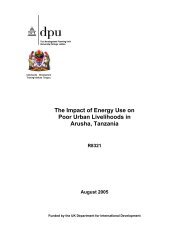EPA Review Annex Documents - DFID
EPA Review Annex Documents - DFID
EPA Review Annex Documents - DFID
You also want an ePaper? Increase the reach of your titles
YUMPU automatically turns print PDFs into web optimized ePapers that Google loves.
The SPS committee provides an opportunity for WTO Member States to raise ‘specific trade<br />
concerns’ over new or existing SPS measures of trade partners. Over the period 1995 to<br />
2009, ACP countries raised seven specific trade concerns (Table 8). 158 All but one of these<br />
concerns related to food safety. Note that two of the seven issues raised related to<br />
mycotoxins, which accounted for 34 percent of border detentions of food and feed from ACP<br />
countries to the EU over the period 2002 to 2008 (Table A4). A further two concerns related<br />
to specific import prohibitions, those by Tanzania and Fiji, which were specific to the<br />
country/region concerned.<br />
Table 8 Specific trade concerns raised by ACP countries, 1995-2009<br />
Year Issue Country Raising<br />
the Concern<br />
Broad SPS Area<br />
1998 MRLs for aflatoxins in Gambia<br />
Food safety<br />
food<br />
Senegal<br />
1998 Trade restriction in<br />
response to cholera<br />
(fruit, vegetables, fish)<br />
Tanzania Food safety<br />
2001 MRLs for pesticides in<br />
fruit and vegetables<br />
Côte d'Ivoire Food safety<br />
2003 Maximum tolerance<br />
levels for ochratoxins<br />
in coffee<br />
2003 EU directive on foot<br />
and mouth disease<br />
(FMD)<br />
2005 EurepGAP<br />
requirements for<br />
bananas<br />
2005 Proposed regulation<br />
for piper methysticium<br />
(Kava-Kava) in UK<br />
230<br />
Papua New<br />
Guinea<br />
Food safety<br />
South Africa Animal health<br />
St Vincent and<br />
the Grenadines<br />
Food safety<br />
Fiji Food safety<br />
Since 2002, the SPS Committee has requested member States to identify their technical<br />
assistance needs through a standard questionnaire. 159 To date, ten ACP countries have<br />
responded to this request, namely Antigua and Barbuda, Dominican Republic, Barbados,<br />
South Africa, Mauritius, Senegal, Gambia, Kenya, Trinidad and Tobago and Uganda.<br />
Responses to the questionnaire provide a broad indication of weaknesses in SPS capacity in<br />
ACP countries (Chemnitz and Gunther, 2006):<br />
• Establishment, revision and/or updating of national food control systems.<br />
• Establishment and/or upgrading of national food legislation.<br />
• Establishment, upgrading and/or accreditation of laboratories.<br />
• Upgrading of human capital in pertinent skills, for example laboratory personnel,<br />
inspectors/auditors, policy officials, etc.<br />
• Establishment of capacity to undertake risk analysis.<br />
• Establishment or upgrading of plant and/or animal pest and disease<br />
•<br />
management/quarantine systems.<br />
Establishment and maintenance of pest-free areas.<br />
• Establishing or strengthening of emergency programmes for plant and/or animal<br />
pests and diseases.<br />
158<br />
<strong>Documents</strong> G/SPS/GEN/204/Rev.8; G/SPS/GEN/204/Rev.8/Add.1; G/SPS/GEN/204/Rev.8/Add.2;<br />
G/SPS/GEN/204/Rev.8/Add.3.<br />
159<br />
<strong>Documents</strong> G/SPS/W/113 and G/SPS/GEN/295.
















